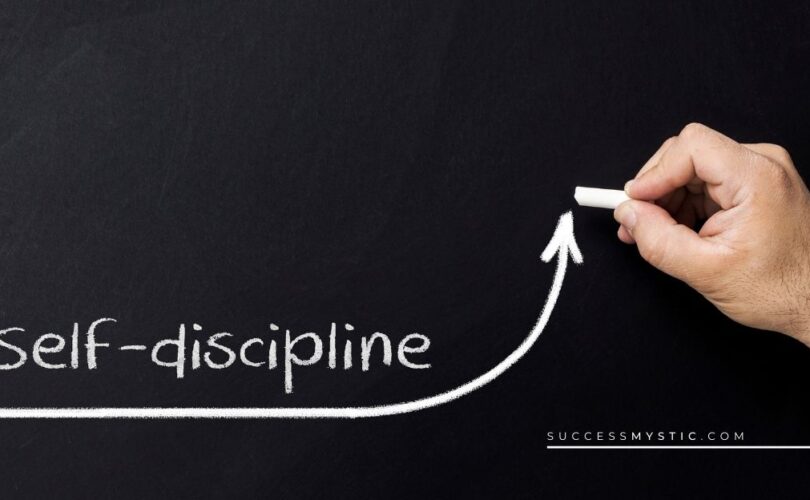In this article: How self-discipline improves your life, gets things done, and helps you manage yourself to perfection.
Everyone strives to be the very best version of themselves they can be–or do they? Often, a lack of drive or ambition causes people to lean toward the lazier side of life. Rather than staying on top of tasks, pushing themselves to work harder, and taking on new challenges, many people prefer the ease of living a less-than-disciplined life.
If you have a lack of discipline in your life, you’ve likely seen some negative impacts. An undisciplined life lacks structure and boundaries needed to keep you on the “right track” in life. Without a goal in mind (and a framework for how you’re going to meet those goals), you seem to wander through life endlessly rather than accomplish anything meaningful.
If you want to make something successful of yourself, reach goals, and explore new heights, you’ll need some discipline to keep yourself on the correct pathway toward success.
Living an undisciplined life can feel scary and out of control, but luckily, you can better understand and harness the power of discipline with some practice.
What It Means To Be Disciplined And Common Characteristics Of A Disciplined Person
Discipline is defined as “control gained by enforcing obedience or order.” However, when you’re referencing your own behaviors, the term “self-discipline” is used. Any time you maintain control over your actions, choices, and thoughts by enforcing your own order and obedience, you are practicing self-discipline.
Having self-discipline means you work hard to keep yourself free of temptations or distractions that take you away from the work and goals you set for yourself to accomplish. Without self-discipline, staying on the right track to get the work done and meet the goals wouldn’t happen–at least not in a timely fashion.
11 Characteristics Of People Who Are Self-Disciplined
People who are disciplined tend to have some of the same traits. The following are examples found in folks with good amounts of self-discipline.
1| People with self-discipline respect all commitments they make.
A self-disciplined person makes a commitment, whether to themselves or someone else, with every intention to meet their promises. A sense of discipline means keeping promises and not letting themselves or someone else down due to a lack of action on their part. Self-discipline drives a person to keep all commitments made, no matter how large or small they may be.
2| People with self-discipline can avoid temptations.
Temptations are everywhere in life. Perhaps you’re eyeing an extra doughnut in the staff work room even though you’re supposed to be eating healthier. After a long day at work, it’s tempting to skip out on your commitments and crash on the couch instead. However, a person with self-discipline understands the importance of avoiding giving in to temptations, however and whenever they may arise.
By giving in to a temptation, you set yourself back a step from moving forward and accomplishing whatever it is you’ve set out to do. Learning to avoid temptations in order to stay on a successful track keeps your life goal oriented–a trait of the highly self-disciplined.
3| People with self-discipline strive to keep on improving themselves.
Practice makes perfect; the highly self-disciplined person always seeks chances to learn something new, try things a different way, or otherwise improve themselves.
When people stop learning and trying new things, they stay the same. Staying the same in some ways can be good, but often, this leads to a stagnant state. When people don’t continue to grow and learn throughout life, their lives often grow stale, predictable, and boring.
People with high levels of self-discipline don’t want to be stagnant forever. Instead, they want to grow and continue improving themselves throughout life.
4| People with self-discipline take time to care for themselves.
You can’t pour from an empty cup; people with self-discipline understand this lesson well. Before you can set out on new challenges, honor commitments, and work toward goals, you need to make sure you are paying attention to your health and needs.
People with self-discipline understand the importance of exercise, healthy eating, resting, and prioritizing their health needs. Taking some “me time” to exercise, go to a yearly check up at the doctor, and prepare fresh meals are a few ways that self-disciplined people care for themselves.
5| People with self-discipline use routines to keep themselves grounded.
A chaotic and unpredictable life can lead to a lot of unintentional sidetracking. People with self-discipline honor routines and schedules to keep themselves on track and forward focused.
Rather than taking each day as a random menagerie of activities, people with self-discipline keep a routine as their framework of how their entire day will go. This framework serves as a solid foundation for success to build.
6| People with self-discipline take time to understand their true desires and life goals.
Rather than bouncing aimlessly from fancy to fancy, people with self-discipline take time to really visualize and understand what they want out of life.
For example, people with high self-discipline often participate in reflective activities, such as journaling, yoga, or meditation to better understand what they want to work toward and achieve in life. With this regular time spent toward understanding what they really want from their lives, they set themselves forward on a strong path to achieve it.
7| People with self-discipline keep deadlines and important information organized.
A forgotten deadline is a big missed opportunity. When a deadline is missed, you’ve either lost a chance to make a move toward something you want to do, or you’ve disappointed someone who was counting on you to come through at a certain time.
People with high levels of self-discipline are incredibly mindful of their deadlines. They find a way to track their deadlines, understand their time constraints, and organize their time accordingly to keep their deadlines in focus.
8| People with self-discipline put facts and thoughts over emotions.
All people have emotions. They are a natural part of being a human being. However, human beings with a strong sense of self-discipline know how to keep their emotions in check–especially when they have the power to affect the outcome of a situation.
Rather than allowing their emotions to take the wheel, people with self-discipline are good at putting their minds and the facts over their emotions. If something happens to rattle or upset them, highly disciplined people will still approach the situation with their emotions to the side so they can get a clear picture of what’s really going on.
9| People with self-discipline are good boundary setters.
A strong sense of self-discipline often comes with the ability to set healthy boundaries.
Rather than allowing their resources to be monopolized, the self-disciplined are able to say “no” when they sense that they can’t fully commit to something. They are also good at setting boundaries for other things–they understand that clear communication is the best way to protect themselves (and their time) from people who may want to encroach upon it.
10| People with self-discipline keep their ultimate goals in mind.
Above all things, people with self-discipline are great at keeping their ultimate goals in the forefront of their minds as they work toward something.
The path to success is rarely linear; even when the path toward meeting a goal may be unpredictable, people with self-discipline are good at remembering why they set out on the journey in the first place. Rather than giving up, self-discipline takes hold and makes the person remember why they’re putting forth the effort.
11| People with self-discipline understand the value of their time.
One of the most valuable resources we all have is our time. We only have a certain number of hours on Earth–how do we plan to spend them? What do we want to accomplish? People with high senses of self-discipline knows these major questions are important to consider any time they prepare to take on new challenges or make commitments.
Since time is so valuable and limited, someone with self-discipline is comfortable with deciding what will or won’t work for their plans. Accepting extraneous tasks, making poor commitments, and dedicating time to unstructured causes doesn’t appeal to the self-disciplined. Instead, they pour themselves fully into commitments that mean the most to them.
5 Benefits Of Having More Self-Discipline
Self-discipline is a trait that benefits people in so many different areas of life. Essentially, any area of your life where you could use more control or focus benefits greatly from exercise of self-discipline. According to Positive Psychology, while there are a wide variety of benefits to developing a sense of self discipline, a few popular areas include:
1| Taking care of your body becomes easier.
Self-discipline is a major crux for developing and maintaining healthy bodily habits. For example, one of the most popular New Year’s resolutions in America involves weight loss. However, the majority of these goals are ditched about a month or so into the new year.
Without a developed sense of self discipline, creating, nurturing, and adopting new habits is incredibly difficult. By taking time to develop some self-discipline, health-related goals become easier to attain.
2| You can meet more professional or work-related goals.
If you’re looking to move forward or make changes in your professional life, self-discipline is a major key player in finding success.
Being able to set and meet work-related goals is a must for advancing in your field. Similarly, if you’re working hard to find a new job, being able to push through applications and prepare for interviews is another labor-intensive process.
Facing big projects and major deadlines at work also involve a focused work ethic to push forward and get them completed. Having self-discipline will help you set your sights on your ultimate professional goals and stick to your plan to see yourself to the end.
3| You can reduce the number of risky or unhealthy behaviors in your life.
Self-discipline yet again proves to be a powerful tool when you’re trying to break unhealthy or risky behavior patterns. Unhealthy habits, such as nail biting, excessive drinking, smoking, overeating, and overspending, to name a few, require self-discipline to separate yourself from repeatedly making poor decisions.
With some practice, self-discipline can be used to divert your attention away from the tempting, unhealthy habit in favor of a better one. While reducing (and eventually eliminating) risky or unhealthy behaviors takes time, patience, and practice, exercising self-discipline is the key factor to finding success.
4| Self-discipline can increase organization and productivity.
If you lead a hectic life, chances are you’d benefit from developing a stronger sense of self discipline. Creating a predictable routine gives your daily life a sense of structure. If you regularly feel underprepared or rushed throughout the day, self-discipline will benefit your organization and productivity goals.
A basic routine helps you feel better prepared for the upcoming day. A basic routine coupled with self-discipline to keep your routine in place will help the finer details of your day fall into place, making it easier for you to be more organized and productive.
For example, if you make a routine of preparing your bag, outfit, and packed lunch for the next day (and exercise self-discipline each evening to make sure it gets done), you’re preparing yourself for a smoother morning–no more dashing around to make your lunchtime sandwich or find that blouse you wanted to wear.
5| Self-discipline can take over when your motivation isn’t there.
Feeling motivated is like being on top of the world. You feel like you can accomplish anything and everything when your motivation is in check. However, it’s not uncommon for motivation levels to waver as you work toward finishing a task, particularly something that is long term. Motivation is a lot like looking at a mountain range–sometimes, motivation is as high as the tallest peaks, and other times, it can feel as low as the valleys between the peaks. This constant “rise and fall” pattern is totally normal.
This is where having self-discipline is extremely useful. Self-discipline steps in when motivation is low (or, let’s be honest, nonexistent) and helps you power through what needs to get done.
Motivation says, “I am ready to get this done,” but self-discipline says, “I know I need to get this done.” When you find yourself in one of those low valleys between motivation mountains, your self-discipline kicks in and allows you to power yourself toward success.
Key Traits You’ll Likely See As You Begin To Develop A Stronger Sense Of Self Discipline
What Will Having More Discipline In Your Life Look Like?
Discipline can be difficult to understand and see. It’s a concept rather than a tangible or visible object; having self-discipline will look differently from person to person. However, there are some key traits you’ll likely see as you begin to develop a stronger sense of self discipline.
Key Trait 1: Organization
People with self-discipline tend to live tidier lives. Their schedules are typically set, prepared, and planned in advance. Their belongings are organized and sorted into their proper places. They have good records of things like receipts, medical forms, and recipes. They keep to-do lists or planners to make sure they don’t forget an important task or deadline.
If this seems overwhelming, don’t panic–different people require different levels of organization to keep themselves on track! For example, some people don’t need a planner to keep up with their appointments and meetings, but others do.
Some people don’t need a system to keep their school notes organized, but some students prefer it. Exercising self-discipline means using it to develop organizational systems (and then sticking to them) where they’re needed.
Key Trait 2: A Calm and Level-Headed Demeanor
Having a strong sense of self-discipline often reflects in a person’s reactions to different situations. In a stressful situation, people with self-discipline know the importance of quelling their emotions so they can focus on the situation at hand.
Rather than reacting harshly out of emotion, they exercise self-discipline by taking a step back and examining the facts before reacting. Do you have a boss who handles rude customers like a pro?
Do you wonder how your teacher handles stressful situations with your difficult classmates so well? Chances are that these folks have excellent self-discipline skills!
Key Trait 3: Goal-Oriented Focus
Folks with self-discipline often know exactly what they want out of life and can articulate those goals clearly. Being able to determine and understand your goals is a sign that you have a strong sense of self discipline.
Being able to set a goal and then see yourself through to the end of the process requires a lot of self-discipline. Often, it’s easier for folks to give up on their goals and find excuses for why they “won’t ever happen.”
People with self-discipline understand the pathway to meet a goal is often long and nonlinear. Setbacks in progress are normal and being able to redirect themselves is a reflection of their strong self-discipline.
Key Trait 4: A Sense of Preparedness
Self-discipline comes easier when there is a backup plan in mind. People with strong senses of self-discipline often have lots of these preparedness plans in mind.
For example, for a person trying to eat healthier, a preparedness plan for how to handle cravings and temptations can help them stay on track to meet their goals.
A few examples of having a plan in place could involve avoiding keeping unhealthy foods in the house, making plans to avoid a temptation treat in advance, or portioning out unhealthy foods into more reasonable servings.
While this example is specific to healthy eating, these kinds of backup plans can exist among any plans to meet a goal. People with self-discipline create them to help themselves maintain control and stay on track while they work to meet their goals.
Key Trait 5: A Strong Understanding of Self
Developing a sense of self-discipline often requires people to look inward and understand themselves better. The longer and harder you work toward developing self-discipline, the more you begin to learn about yourself. When you understand yourself well, you’re able to work with yourself easier.
For example, people with a strong sense of self-discipline likely spent a lot of time with themselves reflecting to understand what strategies do and don’t work for them as they work toward meeting goals and correcting unwanted behaviors.
As they spend this “quality time” with themselves, they learn a lot–for example, strategies they respond to well, triggers that send them down a path of unwanted behaviors, and how they tend to express emotions, to name a few.
While looking at yourself critically can be extremely uncomfortable and difficult, someone with self-discipline knows this is an important practice because it leads to more success.
Key Trait 6: Limits and Boundaries
A big part of exercising self-discipline means setting limits and boundaries. However, these limits and boundaries don’t always involve other people. Often, the self-disciplined must set boundaries within themselves to move forward with their goals.
For example, pretend you’re trying to pass a difficult college course–this task already requires a lot of self-discipline to protect yourself from outside forces (friends wanting to stay out late, etc.). Besides these sort of extraneous factors, there are internal factors that require self-discipline and boundary setting within yourself.
For example:
- Turning your cell phone to “do not disturb” mode during your study hours
- Going to bed at a decent hour so you’re ready for class the next morning
- Feeding yourself nutritious food and getting regular exercise to keep your body in top shape for learning
- Setting goals to finish all your assignments at least one day in advance so you have time to double-check them
- Pushing yourself to earn certain percentages on assignments to make sure you’ll get the grade you want by the end of the course
….and so on! Many of these internal goals require you to set boundaries and limitations on your own behaviors to find success.
Key Trait 7: A Strong Understanding of Emotions and Feelings
People with a lot of self-discipline know the importance of acting based on thoughts and facts rather than emotions. When people act on emotions, they tend to make mistakes because they’ve acted too quickly and often too harshly.
While it may seem that a self-disciplined person is acting without any emotion, this isn’t true–in fact, a self-disciplined person is highly skilled at understanding their own emotions and feelings.
The act of not immediately reacting to tough emotions is understanding and processing them. While self-disciplined people make this seem effortless, it does take practice to perfect. Because they understand how they’re feeling, self-disciplined people are able to sit their emotions aside so they can focus on the facts of their situations.
4 Signs Of An Undisciplined Life
An undisciplined life can appear differently from person to person. There are some hallmark signs and traits to look for, though, as you determine whether or not you could use more self-discipline in your own life.
Sign 1: Everything feels hectic or chaotic, even when it shouldn’t.
Do you catch yourself running into work at least ten minutes late every morning? Do you often skip meals because you feel like there’s not enough time to eat them? Do you procrastinate assignments until the last minute even though you’ve had plenty of time to get them done? These (and many other similar situations) point to a need for more self-discipline!
People with self-discipline are able to rein in their lives and keep themselves prepared. Because they plan ahead, follow some routines, and anticipate their next steps, their lives lose a lot of the hectic or chaotic feeling because they don’t have anything to trigger it.
Life will occasionally throw you a curveball–those are unexpected events that can really shake up your day. However, daily events that are a part of your normal routine can be balanced with more self-discipline.
For example, if you know you need to wake up early for your Monday work shift, use self-discipline to build a routine for success: On Sunday night, get your work clothes ready, your bag packed, and your breakfast ready to go ahead of time.
Sign 2: You allow your emotions to take the wheel in most situations.
Emotions are a natural part of being a human being. Whether they’re the good, the bad, or the ugly, people are going to experience emotions. However, they shouldn’t be the driving force for how you approach every situation.
Often, thinking and acting based on how your emotions are guiding you in the heat of the moment can lead to mistakes.
People with a good sense of self-discipline experience emotions like everyone else, but they are capable of recognizing them and then putting them aside when it’s time to analyze a situation and act on it.
Rather than allowing their emotions to cloud their judgement, they can separate them from the reality of what’s going on to make a sound and rational choice. If you have issues separating your emotions from how you react to most situations, you may need some more self-discipline.
Sign 3: You have a hard time finishing things.
There are always going to be tasks you don’t want to do. Nobody wants to take the dog on a walk when it’s raining, go back to the grocery store for a forgotten item, or set up a dental appointment, but tasks like these are all important to keep life moving. While they’re all mundane (and even downright unpleasant in some cases), they all serve a purpose in daily life.
If you have a difficult time tackling even the simplest items on your to-do list, you may need more self-discipline. Similarly, this sign of an undisciplined life can appear even more obvious when it comes to finishing larger projects.
Do you have a hard time meeting project deadlines at work? Have you given up on your goals to eat better and exercise more? Failure to stick to long term projects and goals is another hallmark trait of an undisciplined life.
Sign 4: You tend to have a negative perspective on life.
Without any self-discipline, your mind tends to wander. When left to wander, the human mind tends to favor its negativity biases. Some negative thinking is good–for example, you recall a bad experience where a coworker lied about you to make herself look better, and you use that bad memory to distance yourself from her toxic attitude.
That’s a good reason to allow negativity to creep into your thoughts. However, humans tend to err toward negativity in ways that are more harmful than helpful.
Self-disciplined people understand that negative thinking usually puts productivity at a standstill. If you’re too busy worrying over what could happen, overthinking a situation, or stressing about an upcoming task, you aren’t using your personal resources properly. Instead of getting things done, you allow your mind to get tangled in a negative web.
How To Determine Specific Areas Of Your Life That Require More Discipline
One of the best ways to understand where you need more discipline in your life is to engage in self-reflection. Self-reflection is the act of taking time to really analyze your thoughts and behaviors to better understand your motivations.
Many people don’t spend time self-reflecting–as a result, they don’t understand much about themselves. This can lead to a chaotic existence. Without some self-reflection, it’s tough to pinpoint where in your life you could use more self-discipline. Luckily, there are many ways for people to practice self-reflection.
Method 1
Create a written representation of your self-reflections to look for patterns.
A written representation of your thoughts, feelings, and actions is a good way to look for any repeating patterns. These can exist in the form of mood trackers, journals, diaries, vision boards, and more. By keeping a written or drawn record of your thoughts and feelings, you can look at the trends you’re experiencing over long periods of time.
For example, try writing out your list of daily activities for an entire week. At the end of the week, analyze your list of activities for patterns. Perhaps you will notice some activities that specifically cause you feelings of stress.
You may notice that you’re doing some unpleasant activities more often than you need to (such as going to the grocery store right after work, when it’s the busiest). You can use these observations to begin making small changes to begin acting more intentionally. By using this personal data, you can begin to add more structure and discipline in your life.
Method 2
Try mindfulness or meditation practices.
Finding some peace within yourself is a great way to self-reflect. Mindfulness and meditation practices are a way for you to quiet your mind of the noise and chaos of life that clogs your thoughts. When you spend time in mindfulness or meditation, you force yourself to be in the present moment.
Often, during mindfulness or meditation, people can use this moment of peace to analyze themselves and determine how they truly feel about something. In these moments, it’s easier to be open and honest with yourself.
If something about your life feels too hectic or chaotic, you can explore ways to address it with self-discipline when you complete your mindfulness or meditation and return to your daily routine.
Method 3
Get comfortable with facing the truth about yourself and your feelings.
People are great avoiders. When we come in contact with an unpleasant situation, it’s natural to want to run away or have a blind eye to the seriousness of the matter to protect ourselves. However, if you’re avoiding something that’s making it harder for you to live a disciplined life and get things done, you’re only hurting yourself.
To combat this, you can begin asking yourself serious questions when life feels too hectic or out of control.
For example, consider stepping aside for a second and asking yourself some of the following:
- Is this what I really want?
- Is this good enough for me?
- Is this choice bringing me peace or happiness?
- Am I comfortable with allowing things to continue this way?
- Will this (routine, action, etc.) bring me future success or happiness?
…. if the answer to any of these questions is “no,” you’ve likely just identified a place in your life that needs more discipline.
Asking these questions is uncomfortable, but they are a direct way to practice self-reflection and get to the bottom of what’s not working well in your life.
4 Ways To Introduce Discipline Into Areas Of Your Life
Developing self-discipline takes practice. You could even say that developing self-discipline…. requires a little self-discipline! Luckily, the more you practice introducing and then practicing self-discipline, the easier it will become to implement in different areas of your life. You can begin introducing more self-discipline in your life with some simple exercises.
1| Implement some routines for certain parts of your life.
Routines make it easier to prepare yourself for what’s coming next. When you feel prepared to tackle a task, you’re prepared for success. Because sticking to some routines keeps your life organized, it helps you maintain your sense of self-discipline where it’s really needed.
A few examples of routines you can implement to make your life run smoother are:
- A bedtime routine
- A morning routine
- An exercise routine
- A meal planning routine
- A house cleaning routine
- A studying routine
- ….and many more!
2| If at first you don’t succeed, try again!
This one seems simple, but it’s truly the heart of developing a strong sense of self discipline.
Often, when people try something new for the first time, they fail. It takes time to learn new skills and build new habits. Rarely do people get something perfect on the first try. Despite this fact, failure often makes people immediately stop trying.
Self-discipline requires a lot of second (or even third and fourth) tries after a setback. However, conquering this self-discipline feat requires one simple action: Trying again! Even when you feel at your most defeated after a failure, get up, dust yourself off, and give the task another tries.
For example, consider Margot. She is on a weight loss journey. For the first week of her journey, Margot finds great success–she’s lost two pounds. However, after the second week, she feels tired of her new habits and spends two days eating whatever she wants and not exercising.
In the past, this setback would make Margot think, “I should just quit now, I obviously can’t do this.” Instead, Margot uses her self-discipline to get herself back on track by saying, “My next meal is going to be healthy, and I will take a brisk walk after dinner.” While she may have momentarily slid away from her main goal, Margot used her self-discipline to get back on track.
3| Try breaking down some of your bigger goals into smaller, more manageable ones.
Big goals can feel overwhelming, making it feel impossible to ever achieve them. If the idea of tackling a giant goal weighs heavily on your growing sense of self discipline, consider making a big goal easier to manage.
By taking a large goal and breaking it into smaller, bite-sized goals, you can make it much easier to bolster your self-discipline and stay on track in the long term. For example, you can apply this technique to a weight loss goal. If you have a big goal of losing 100 pounds, but the prospect of having to lose that much weight feels intimidating, break it down into five-pound mini goals.
Every time you lose five pounds, congratulate yourself and then begin working on the next mini goal–your next five pounds. Eventually, you’ll meet your long-term goal by focusing on the smaller increments. This is an excellent way to stay motivated and to allow your self-discipline to flourish in your successes.
4| Engage in more reflection and self-assessment.
It’s tough to look at yourself in the proverbial mirror. When we analyze our actions and words, the reaction can feel almost visceral–however, taking time to reflect and perform self-assessment is a major part of increasing self-discipline.
When you take time to really look at yourself, you can determine which parts of your life need more discipline and attention.
For example, after getting into a fight with your partner, it’s important to reflect on the things you said or did during the altercation. Did you say something really harsh? Do you feel remorseful or regretful of how you acted? Use this personal data to engage in self-discipline next time a disagreement arises–you can avoid confrontation and engage with your partner in a healthier way.
What Does It Mean To Manage Yourself To Perfection?
Perfection is a conditional word. There is no singular image of “perfection” that is shared among every single person. Perfection is defined by everyone differently and understanding your personal sense of perfection is important.
When you consider what your life will look like when you are using self-discipline to meet goals and accomplish tasks, consider some “broader strokes” of existence you can use to determine what perfection will look like for you.
For example, to determine what perfection is for you, consider the following when you’re setting goals and making decisions:
- Does this choice fit the plans I have for myself in the future?
- Will this choice help me get closer or further away from my goals?
- Will this choice bring me peace, joy, or happiness?
- Am I making choices that are supportive of my wellbeing?
- Do I feel confident about the choice I want to make?
- Is this choice going to make me feel regretful afterward?
- Does this choice feel healthy?
- Am I approaching my choices with a positive mindset?
- Is this choice being made with any negative thoughts in mind?
As you begin to build and develop your sense of self discipline, you’ll find ways to plug this versatile tool into nearly every aspect of your life.
However, something important to consider as you begin to focus your self-discipline into more areas of your life is your intention. Goals, desires, and dreams can change over time. As you (or your interests) change, you can realize that your pathway needs to change as well.
This is completely normal–many people make new self discoveries as they advance closer to something they desire. If your self-discipline is pushing you closer to meeting this goal, it’s important to allow yourself some flexibility.
Self-discipline can keep you on a rigid track to success, but it’s important to realize that some setbacks are necessary to divert you to the best pathway. The true path to most successes in life is rarely linear.
The Bottom Line
Self-discipline is an amazing, versatile tool that can improve nearly every aspect of your life. As you practice and develop a strong sense of self discipline, you’ll find yourself accomplishing great tasks, advancing further in life, and finding success. However, self-discipline is also a highly reflective practice–you also understand the importance of flexibility, self-reflection, and humility.







